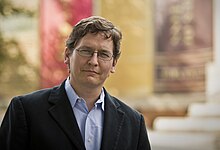John Wilbanks | |
|---|---|
 Wilbanks in Kansas City in 2009 | |
| Education |
|
| Occupation | Senior Fellow |
| Organization | Ewing Marion Kauffman Foundation |
John Wilbanks is a Senior Fellow at the Datasphere Initiative, former Head of Data at Biogen Digital Health, former Chief Commons Officer at Sage Bionetworks,[1] and Executive Director at Science Commons.[citation needed] He served as a Senior Fellow at the Ewing Marion Kauffman Foundation and at FasterCures. He is known for his work on informed consent, open science and research networks. Wilbanks led a We the People petition supporting the free access of taxpayer-funded research data, which gained over 65,000 signatures.[2] In February 2013, the White House responded, detailing a plan to freely publicize taxpayer-funded research data.[3]
Scientific American featured[how?] Wilbanks in "The Machine That Would Predict The Future" in 2011.[4] Seed magazine named Wilbanks among their Revolutionary Minds of 2008, as a "Game Changer" [5] and the Utne Reader named him in 2009 as one of "50 visionaries who are changing your world".[6] He frequently campaigns for wider adoption of open access publishing in science[7][8][9] and the increased sharing of data by scientists.[10][11]
- ^ Cite error: The named reference
sagebiowas invoked but never defined (see the help page). - ^ "John Wilbanks TED Profile". Retrieved 12 Mar 2013.
- ^ Mike Masnick (Feb 2013). "White House Orders Federal Agencies To Require More Open Access To Not Just Research, But Data". Retrieved 27 Mar 2013. - Direct link to response is in this article. Blacklisted by WP's spam filter.
- ^ "The Machine That Would Predict The Future". Scientific American. Retrieved 2011-11-18.
- ^ "John Wilbanks - Science Commons". Seed Media Group. Archived from the original on 2008-12-04. Retrieved 2009-01-06.
{{cite web}}: CS1 maint: unfit URL (link) - ^ "John Wilbanks - Executive Director, Science Commons". Utne Reader. Retrieved 2009-10-16.
- ^ Wilbanks, J. (2006). "Another reason for opening access to research". BMJ. 333 (7582): 1306–1308. doi:10.1136/sbmj.39063.730660.F7. PMC 1761190. PMID 17185718.
- ^ Richard Poynder (2012-05-25). "Open Access: The People's Petition". Retrieved 2012-06-01.
- ^ Subbaraman, Nidhi (2019-12-20). "Rumours fly about changes to US government open-access policy". Nature. doi:10.1038/d41586-019-03926-1. PMID 33340013. S2CID 214378269.
- ^ Field, D.; Sansone, S. -A.; Collis, A.; Booth, T.; Dukes, P.; Gregurick, S. K.; Kennedy, K.; Kolar, P.; Kolker, E.; Maxon, M.; Millard, S.; Mugabushaka, A. -M.; Perrin, N.; Remacle, J. E.; Remington, K.; Rocca-Serra, P.; Taylor, C. F.; Thorley, M.; Tiwari, B.; Wilbanks, J. (2009). "'Omics Data Sharing". Science. 326 (5950): 234–236. Bibcode:2009Sci...326..234F. doi:10.1126/science.1180598. PMC 2770171. PMID 19815759.
- ^ Wilbanks, J. (2011). "Openness as infrastructure". Journal of Cheminformatics. 3 (1): 36. doi:10.1186/1758-2946-3-36. PMC 3197551. PMID 21999327.